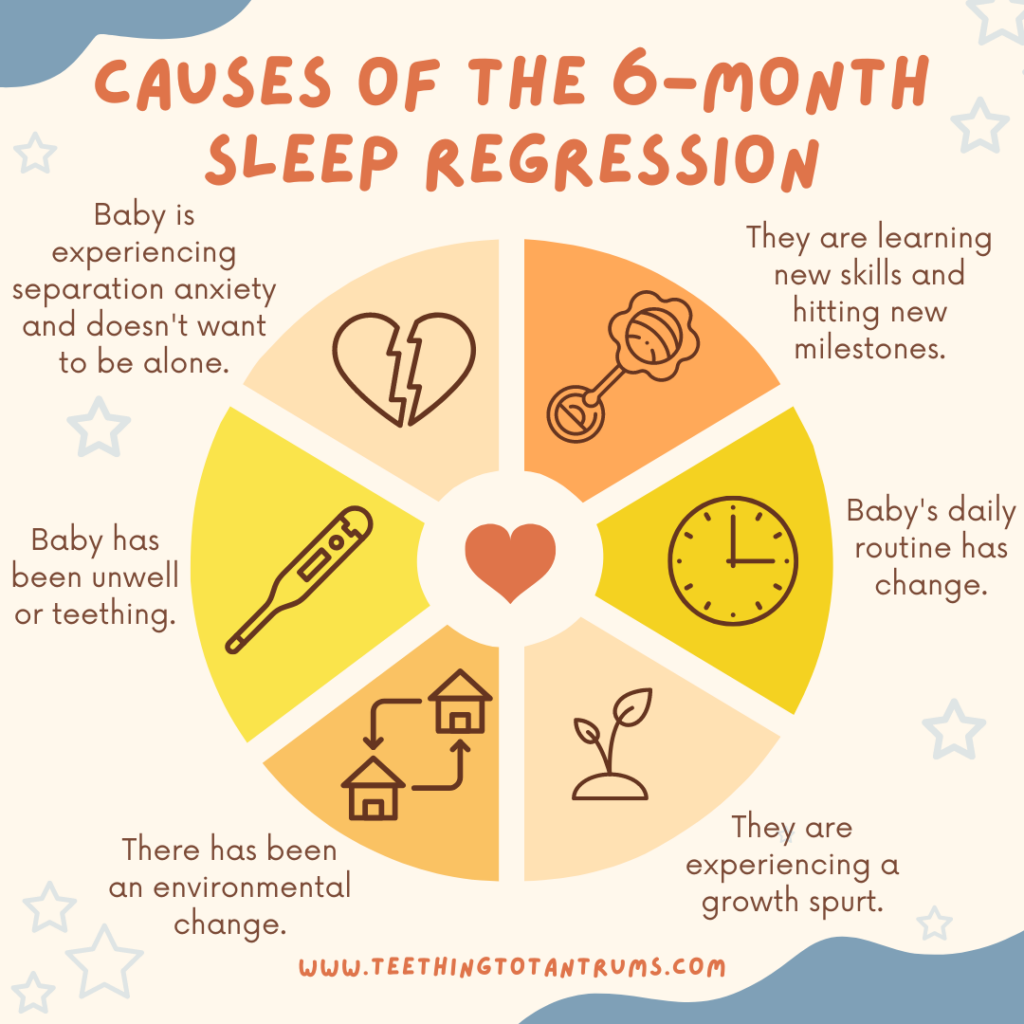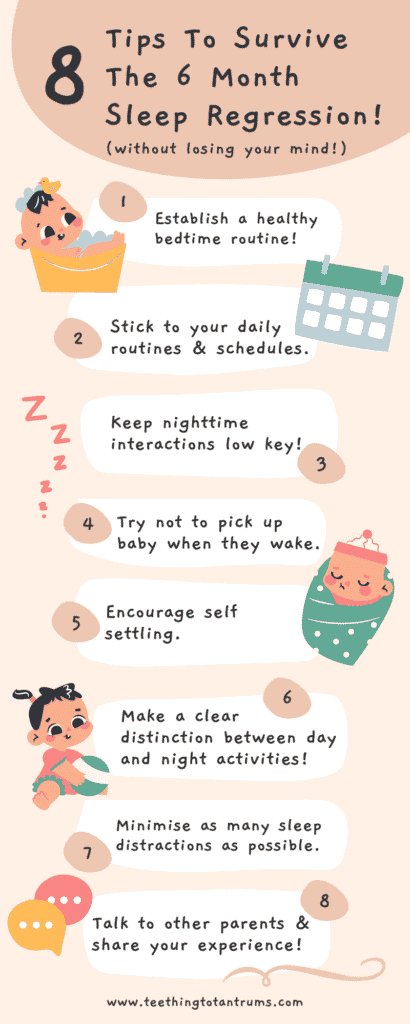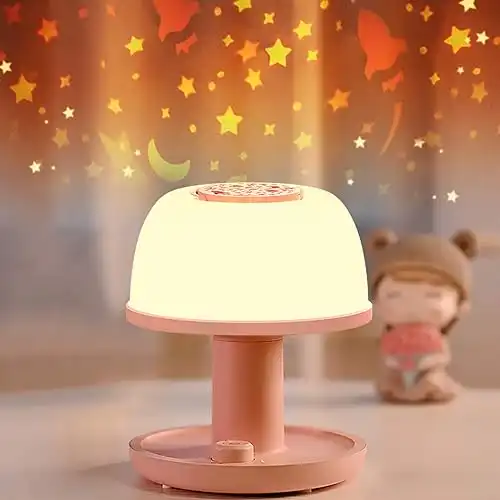We’ve all heard of the 4-month sleep regression and the 8-month-old sleep regression… But what about the 6-month sleep regression? Is it real? How long does it last for? And what are the top tips to survive baby’s sleep regression?
What Is The 6 Month Sleep Regression?
A 6 month sleep regression is a short period of time in which your baby’s sleep pattern becomes disrupted by them fighting sleep, waking more often and struggling to fall back asleep usually as a result of developmental leaps.
How Long Does The 6 Month Sleep Regression Last?
A 6 month sleep regression usually lasts between 5 days and a couple of weeks. The most important thing to remember when your baby is going through a sleep regression is: it is just a phase and will not last forever.
Do All Babies Go Through A 6 Month Sleep Regression?
No. Not all babies will experience a 6 month sleep regression. It will depend on the personality of your baby, what is going on in their development and what is happening in their environment.
6 Month Old Sleep Regression Signs
The signs to identify whether your baby is going through a 6 month sleep regression or not are:
- Does baby take longer naps during the day and less nighttime sleep?
- Is baby crying more and becoming agitated when they wake?
- Do they wake more often at night (wanting night feedings and comfort) and struggle to get back to sleep?
- Do they struggle to fall asleep in the first place?
- Are their days filled with inconsistent sleep patterns?
- Does baby fight sleep despite being tired?
If you answered yes to these questions, then most likely your baby is experiencing a sleep regression.
But don’t worry, there is a lot you can do to get through this tricky phase without losing your routines or sanity.
Causes Of The 6 Month Sleep Regression
There is not always one clear reason why your baby may be experiencing a sleep regression but at 6 month mark there is a lot going on in your baby’s world that can disrupt their sleep patterns.
Check out these causes of the 6 month sleep regression and see if you can identify any that may have occurred in your baby’s life recently:

- Your baby is having a growth spurt. All that extra energy needed to grow can easily disrupt a well-established sleep pattern.
- They are reaching big physical, mental and emotional developmental milestones. And all that extra brain and body activity from tummy time can easily disrupt their sleep and trigger night wakings.
- Baby’s sleep environment has changed. Moving house, going on holiday or visiting family overnight can all trigger a sleep regression.
- Baby’s daily routine has changed. Any major changes to your baby’s normal sleep patterns could also upset an established sleep schedule such as starting daycare, parents returning to work or the primary caregiver changing.
- Your baby is experiencing separation anxiety. Separation anxiety will make it difficult for your baby to fall asleep and can cause them to become distressed when they wake up in the night and discover you’re not with them.
- They’re teething or unwell. If your baby is experiencing pain due to teething their sleep at night is very likely to be disrupted for a short while and although this is not a true sleep regression in itself, it may trigger one. Investing in a natural teething toy can help soothe your baby resulting in better sleep. And like teething, illness may cause a sleep disruption for a short period of time and although this is not a true sleep regression, sickness can trigger a brief one.
8 Expert Tips To Get Through The 6 Month Sleep Regression
Having worked with many families over the years, I have tried and tested many techniques to help parents and babies get through sleep regressions as quickly and painlessly as possible.
Now… I’m not going to sugarcoat this.
Getting through a sleep regression is tough.
I know you’re so exhausted you can barely think straight… and I know that the last thing you want to do is lose any more sleep yourself.
But, you need to persevere with your previously established routines and stick to your guns because by sticking it out now, your baby will go back to their previous sleep routines much quicker and you won’t have to undo any bad sleep habits down the line.
Think of it like this: short-term pain for long-term gain.

1. Establish A Healthy Bedtime Routine
If you have not established a bedtime routine now is 100% the time to do so. Having healthy sleep habits will make it easier for you to cope when your baby decides to fight sleep.
And making it clear to your baby that the end of the day is marked by lowering the energy levels, getting into a cosy bedroom, reading a bedtime story and following the same consistent bedtime routine will give them all the right signals that sleep is on the way.
TOP TIP: If you only have one routine that you live religiously by… make it the bedtime routine. After all… everything revolves around sleep. And if baby is well rested, they will take everything else in their stride.
2. Stick To Your Routines
I cannot stress how much maintaining baby’s healthy daily and bedtime routines will help to keep you sane and keep their healthy development on track.
I know life gets in the way sometimes, but being super vigilant about nap times, meal times and bedtimes during a sleep regression will make your life so much easier as baby’s internal clock will recognise the regular schedule and get back into a consistent sleep schedule much sooner.
So, if you have to cancel a few plans over the coming weeks to ensure you’re at home for naps and bedtime, trust me it will be worth it in the long run.
Looking to get your little one to sleep quickly and effortlessly? Check out my Bedtime and Nap Cheat Sheet and master the art of making daytime naps and bedtimes as seamless as possible.
A bedtime & nap cheat sheet so good your little one will ask you to put them to bed...
Laura Williams "This is a life saver! I'm so glad I downloaded your bedtime & nap cheat sheet. My little one actually asked me to put him to bed last night! Unbelievable! Thank you so much!"
Click Here For The FREE Cheat Sheet
3. Keep Night Time Interactions Low Key
If your little one wakes at night then it’s super important to keep your interactions low-key.
Have the lights down low and do not chat to them.
A night light is a great investment for these nighttime interactions as it stops you from having to turn on any bright lights when visiting them at night.
Finding the right night light for your child can be quite a task. You want something safe, comforting, and practical. The Cozy Starry Night Light ticks these boxes, with eye-friendly warm lighting and an easy-to-use dimmer.
Its gentle glow makes it the best night light for feeding baby, diaper changes, or comforting your little one back to sleep.
As your baby grows the Cozy Starry Night Light's starry sky projection can provide comfort and gentle quiet time stimulation. Its soft lighting ensures a dreamy, peaceful environment, supporting your baby’s natural sleep cycle.
It really is a fantastic nightlight (at a very reasonable price!)
- Eye-friendly warm lighting with adjustable brightness.
- Includes a timer function for convenience.
- Projects a starry sky that is soothing for little ones.
- Rechargeable battery, so it's very portable.
- A USB adapter is not included for charging.
- The star projector is static without motion (however, this is ideal for very young babies and toddlers).
- Battery life varies based on the brightness settings.
4. Try Not To Pick Baby Up Every Time They Wake Up
When it comes to nighttime wakings, try to comfort your baby in the crib rather than picking them up.
Picking your baby up has the association that their sleep is over. This can then lead to difficulties getting them to fall back asleep when you put them back down.
This is especially true if your baby fights sleep during a 6 month sleep regression. Therefore, try gently stroking their head or patting their tummy instead.
5. Encourage Self Settling
If you have not done so already, try and teach your baby to self-settle. Allow them to spend time in their cribs during their awake time and put them down when they are not fully asleep.
And if your baby wakes in the night do not rush in straight away as they may re-settle themselves after a few minutes.
If you’d like to learn more about teaching your baby to self-settle, I have made a quick video explaining it in more detail below.
NOTE: Self-settling is not a sleep training method.
6. Make A Distinction Between Day And Night Activities
Make sure your little one makes the most of their day. Keep busy and get out into the fresh air. Encourage your baby to be engaged in different types of play and explore their world.
Then, about an hour before bedtime, begin to lower the energy levels so your baby learns the sleep cue that bedtime is approaching.
7. Minimise Sleep Distractions
Sleep distractions can be anything from dogs barking; post arriving; dropping a plastic tub on the floor or changes to their surroundings.
Your little one needs to be sleeping in a calm, dimly lit room ESPECIALLY when going through a six-month sleep regression. Some parents like to use a white noise sound machine and I am a huge advocate of them.
White noise machines will help to ensure that sudden changes in noise will have less of an impact on your sleeping baby which will mean you do not have to panic if you accidentally drop the TV remote!
White noise machines are a game-changer for your little one's sleep and having one that plays all night is a must. With a long-lasting battery, this compact and stylish white noise machine contains 21 non-stop relaxing noises, which will lull your little one to sleep night after night, no matter where you are!
REMEMBER: It’s important for babies to learn to fall asleep in different locations and to different noises, but when they’re going through a 6 month sleep regression… keep things as simple as possible and encourage baby to sleep in the same safe sleep space every time.
8. Chat To Other Parents And Share Your Experience
Sharing is a great way to help you through a 6 month sleep regression. Knowing you are not alone or that others have been through the same thing will be very comforting and give you reasonable expectations about when to expect your little one to sleep through the night again.
Do a quick Google search, talk to your paediatrician or talk to your local daycare to see if there are any groups in your local area who can help you connect with other parents.
Self-Care For Parents Of A Sleep Regression Baby
Sleep regressions or sleep disruptions are common, especially in the first year of life.
Accepting this is normal and has nothing to do with your parenting will ensure that you are not blaming yourself for what is a perfectly natural occurrence.
In fact, I would challenge any parent to say that their little one has never had a blip in their sleep schedule!
Don’t be too hard on yourself if you are finding it tough to be consistent with sleep routines and nap times, just hang in there, do the best you can and remember that this is a passing phase.
If you are feeling very tired, then put your little one somewhere safe, such as a playpen or crib, and make yourself a cup of tea and have a 5-minute break.
You will be a better parent when you go back after doing this.
NOTE: The content on this post is for informational purposes only and should not replace medical advice from your sleep consultant, doctor, pediatric sleep physician, or medical professional.
Frequently Asked Questions About The 6 Month Sleep Regression
Looking for more information about the six-month sleep regression? Find the answers to the most common questions here.
How Much Sleep Should A 6 Month Old Have?
A 6 month old should be having around 15 hours of sleep over a 24-hour period.
What Does A 6 Month Old Sleep Schedule Look Like?
A 6 month baby will take 10 to 12 hours of sleep at night and have about 3 to 4 hours of sleep split across 2-3 daytime naps.
To learn more about the 6 month sleep schedule click here: 6 Month Sleep Schedule.
Can I Still Do Nighttime Feedings During A Sleep Regression?
Yes, you can still do night feedings IF that is what you were doing before baby entered a sleep regression.
However, if you have already stopped night feeds, I would not recommend re-introducing them as a way of comforting baby back to sleep as it will only create an unhealthy sleep association for you to break in the future.
Is There Really A 6 Month Old Sleep Regression?
Despite being less well know, yes, there is a 6 month sleep regression. In fact, a sleep regression is possible at any time from 4 months of age onwards.
Need More Parenting Help?
- Download our FREE Perfect Sleep Cheat Sheet. It’s a free, easy-to-use and proven formula designed for parents of 0-5 year olds to master the art of consistently undisturbed and restful sleep without the yelling, nagging or exhausting long-winded evenings.
- Check out our Parenting Toolbox. You’ll get access to expertly-chosen products that you can guarantee are the best for your little one and your wallet.
- Ready to create the calm, peaceful evenings you deserve? Then checkout our most popular course - The Bedtime Battles Masterclass

A bedtime & nap cheat sheet so good your little one will ask you to put them to bed...
Laura Williams "This is a life saver! I'm so glad I downloaded your bedtime & nap cheat sheet. My little one actually asked me to put him to bed last night! Unbelievable! Thank you so much!"
Click Here For The FREE Cheat Sheet




